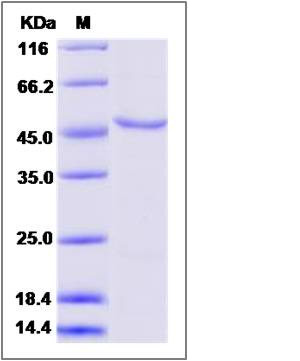Human CARKL / SHPK Protein
CARKL,SHK
- 100ug (NPP1973) Please inquiry
| Catalog Number | P14833-HNCB |
|---|---|
| Organism Species | Human |
| Host | Baculovirus-Insect Cells |
| Synonyms | CARKL,SHK |
| Molecular Weight | The recombinant human SHPK consists of 479 amino acids and has a calculated molecular mass of 51.5 kDa. The recombinant protein migrates as an approximately 47 kDa band in SDS-PAGE under reducing conditions. |
| predicted N | Gly |
| SDS-PAGE |  |
| Purity | > 85 % as determined by SDS-PAGE |
| Protein Construction | A DNA sequence encoding the human SHPK (NP_037408.2) (Ala2-Ser478) was fused with two additional amino acids (Gly&Pro) at the N-terminus. |
| Bio-activity | Kinase activity untested |
| Research Area | Immunology |Signal Transduction |Metabolism |Types of disease |Metabolism in Cancer |
| Formulation | Lyophilized from sterile 20mM Tris, 500mM NaCl, 3mM DTT, 10% glycerol, pH 7.4. 1. Normally 5 % - 8 % trehalose, mannitol and 0.01% Tween80 are added as protectants before lyophilization. Specific concentrations are included in the hardcopy of COA. |
| Background | CARKL, also known as SHPK, is a nonprotein kinase of glucose metabolism. CARKL has weak homology to several carbohydrate kinases, a class of proteins involved in the phosphorylation of sugars as they enter a cell, inhibiting return across the cell membrane. CARKL catalyzes an orphan reaction in the pentose phosphate pathway, refocusing cellular metabolism to a high-redox state upon physiological or artificial downregulation. CARKL-dependent metabolic reprogramming is required for proper M1- and M2-like macrophage polarization and uncover a rate-limiting requirement for appropriate glucose flux in macrophage polarization. |
| Reference |
